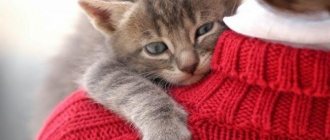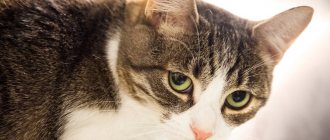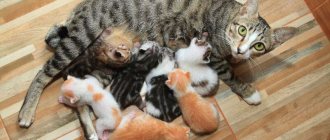You can download the sound of a cat meowing here for free in MP3. We have natural sounds of meowing from different cats and cats. There is the sound of a cat with a kitten, there is the sound of a cat asking to open the closet. Cats meow in different situations. The sounds are of excellent quality, you can listen to them online or download them for editing.
Total sounds: 23
Category: Animal Sounds
Total listening time for all tracks: 05 minutes
Downloading the sound of a cat meowing from our selection is easy and safe. We have put together this collection for your different purposes. Here you can easily and quickly listen online to how different cats meow, or you can download them for sound design of any content. Use meowing sounds in video materials for sound editing, in podcasts or on radio, as well as stage productions.
You can download the sound of a cat meowing in the popular MP3 format, in good quality. Often cats don't meow the way we expect. Large adult cats can meow in gentle and very quiet voices, but cute fluffy cats suddenly begin to meow loudly in rough, hoarse voices. When creating a sound design for a video, it doesn’t matter what voice the original meows in; what matters is the texture and mood.
Can cats meow constantly for no reason?
Meowing for no reason is impossible. The cat's meow is a verbal, that is, vocal, method of communication. Our pets use it in only 2 cases: for communication and to attract attention. In the first case, they just talk, and in the second, they try to explain what exactly is bothering them.
Thus, there is always a reason, and, in addition to banal boredom due to attention deficit, it may be a life-threatening pathology.
Why does a cat constantly meow for no apparent reason?
“Meows for no apparent reason” is a more correct formulation. You may not actually be able to see the real source of the problem, so try to find it first. Associated symptoms, including behavioral changes, will help you with this.
Physiological desires
Non-dangerous explanations include physiological desires. This includes:
- Hunger and thirst. Cats use the loudest and most demanding “meow” when asking for food. It is with its help that they wake up their owners early in the morning and beg for treats or supplements. They may also not like the freshness of the water, which means it’s time to update it.
- Instinct of reproduction. Features of manifestation depend on gender. Cats actively mark their territory, and cats roll around on the floor and freeze in a characteristic pose. They have only one thing in common: during sexual hunting, both of them cry heart-rendingly, inviting a partner for mating.
- Desire to defecate. If the screams are accompanied by jumping, then the pet is simply preparing to go to the toilet. Your help will only be needed when the “meow” is a request to change the filler.
In all of these situations, only anxiety and increased activity are acceptable. The general condition of the animal must remain satisfactory.
To attract attention
A request to change the filler and water is also attracting attention, but this section is about something a little different. Sometimes a pet is completely satisfied from a physiological point of view, but still continues to scream, pursuing the following goals:
- Request for help. Kittens often call for help if they cannot get off a high surface or get stuck behind a cabinet. Also, mustachioed pets love to be hysterical so that the door will be opened for them. And it doesn’t matter that in a minute they will have to go through it again.
- Communication. A small amount of games, petting and talking is unacceptable for contact animals. With their voice they ask to be held or called to play.
Separately, it is worth noting the manipulations. With a plaintive “meow,” a cunning pet can beg for a piece of your dinner or the right to sleep on the kitchen table.
Pain, discomfort
If a meowing cat looks painful, examine it. Check your stomach first. Most often, meowing is associated with stomach pain, but in addition to it, there are other causes of discomfort:
- Diseases of the urinary system. KSD and cystitis increase the vulnerability of the mucous membrane. In severe cases, blood appears in the urine.
- Gastrointestinal diseases. In addition to the stomach, pain syndrome can also affect the intestines. In both cases, symptoms include bowel movements and vomiting.
- Helminthiases. The activity of helminths causes severe intoxication, therefore, as with gastrointestinal diseases, diarrhea and nausea are noted. With severe damage, it is possible to detect eggs and the parasites themselves in the feces or in the anus area.
- Tumors. Cause pain due to pressure on nerve endings. May be accompanied by weight loss, severe apathy and sleep disturbances.
- Injuries. Not all damage is visible to the naked eye. Some injuries can only be detected with an x-ray.
- Flea or tick infestation. Accompanied by severe itching and hair loss. Some types of parasites are also dangerous to humans.
- Viral and bacterial infections. Most infectious lesions are characterized by high fever, loss of appetite, severe lethargy and hoarseness of the voice.
- Consequences of sterilization or castration. The only non-dangerous situation caused by unpleasant recovery from anesthesia. Complications are possible here, but with proper care of the operated patient they occur very rarely.
Cats are very patient. They are able to suppress any unpleasant sensations for quite a long time. If your pet is screaming in pain, do not hesitate to diagnose, as the discomfort he is experiencing has reached its limit.
Irritation, stress, fear
Another reason is an unpleasant situation. The animal may react to it in the following ways:
- Irritation. Cats get annoyed when they are petted against their will. In response to unsolicited affection, they may meow aggressively, slash with their claws, or cling to your hand.
- Stress. Moving, having a new family member, traveling on public transport and other situations that differ from the usual way of life require getting used to. The animal will worry and scream until it feels safe.
- Fright. Many mustachioed pets do not like thunderstorms, fireworks, loud screams and the noise of a vacuum cleaner. When the source of anxiety disappears, they calm down and become silent.
Prolonged and too frequent stay in a tense state is fraught with a nervous breakdown. To avoid mental problems, the animal needs to demonstrate the safety of the threat or try to eliminate it.
Psychological diseases
Old pets, like their owners, are not protected from Alzheimer's disease. A plaintive “meow” at night may be associated with disorientation in space due to memory problems.
Imminent birth or false pregnancy
During a close birth, the animal feels vulnerable and uncomfortable. Young mothers awaiting the birth of their first kittens feel especially nervous. Similar feelings arise during false pregnancy.
Territory defense
An angry meow in a raised voice, reminiscent of a scream, is a sign of aggression. With its help, the animal protects its territory from invaders. Similar behavior is observed when keeping several mustachioed pets at the same time or when moving to a new place where there are no cat odors yet.
Communication with man and fellow humans
The most talkative breeds are Orientals. They constantly communicate with their owners, coming up with more and more new “meow” sounds for different occasions.
Animals also talk to each other, but meowing is most often used by mother cats communicating with kittens, as well as those who defend their territory. Adult and friendly pets are more prone to purring.
Reasons for meowing
Meowing for a cat is like talking for a person. An animal may meow not necessarily because of any problems - it is possible that it is just very talkative.
Demand for attention
If a cat meows loudly and often, then this is a clear sign of insufficient attention. In this case, the cat can approach the owner and sit down, turning away from him, repeating this action many times. The owner must properly organize the pet’s diet and daily routine. Then the animal will not meow around the clock, demanding attention.
Video: the cat meows, demanding attention
Pain
The animal “talks” about pain by emitting a plaintive, drawn-out meow. In addition, the cat may behave restlessly, fuss and purr.
Video: cat meows in pain
Stress
Cats are subject to frequent stress, which is why they start meowing all the time. They occur in animals for the following reasons:
- moving;
- New furniture;
- constant absence of the owner;
- Small child;
- a trip to the vet;
- a lot of guests;
- vacuum cleaner operation;
- excessive attention;
- the arrival of a new pet in the family.
There are additional signs by which you can recognize stress in a cat:
- frequent licking and yawning;
- heavy breathing, sometimes with an open mouth;
- eating inedible things - flowers, wool;
- dull dirty fur;
- poor or too good appetite;
- damage to furniture;
- aggression or complete apathy.
Stress causes your cat to meow frequently.
Stress is dangerous for a cat as it can lead to its death. Therefore, the owner must understand its cause and eliminate it as soon as possible. To eliminate it, you need to consult with a veterinarian; it is not necessary to take the animal to him - he will prescribe sedatives to the cat and courses of behavior correction to socialize the animal.
One day our cat Lisa accidentally ran out of the house. We looked for her for two days, but she ended up in a hole in the basement - she sat there quietly. After this, the cat began to eat poorly. We thought she was sick, but the vet told us that the animal was stressed. Most likely, it was associated with the impressions that the cat experienced during its two-day life on the street. The doctor prescribed her sedatives and two weeks later our pet began to eat normally.
Hunger
When an animal is hungry, it emits a loud, frequent meow, and the intonation sounds demanding. When food is not received, the vowels are drawn out more and more, and the intonation may change from demanding to pleading. A short meow indicates that the animal is asking for food to be served as soon as possible.
If a cat brings a strangled bird or mouse, then out of love for you she offers to share a meal with her. There is certainly no point in scolding this animal - you can praise it and throw away the prey.
When a cat feels hungry, it makes frequent, loud meows.
Video: cat meows from hunger
Fright
When cats are worried, they meow protractedly, using questioning intonations. If a cat is very frightened, it often hisses, waving its tail in different directions.
When frightened, a cat may also try to scare the offender. In such a situation, the fur on her tail and back stands on end. At these moments, the animal’s pupils dilate, and the ears are pressed to the head or directed to the sides. Sometimes an excited cat begins to actively lick its lips and nose.
When feeling scared or anxious, cats emit a drawn-out meow.
Video: the cat “spoke” out of fright
Greetings
Usually the animal is happy to see its owner. At the same time, it emits a short, aspirated purr. The cat runs up to the owner, raising its tail up or bending its tip slightly. She can let out a long purring out of joy.
Video: cat meets owner
Desire to play
If an animal decides to play with its owner, then it can look into his eyes, meowing briefly and demandingly. In this case, the animal’s whiskers are directed forward. But one should distinguish a playful state from anger - in a complacent state:
- claws not extended;
- no growling or hissing;
- bites are weak;
- the back is not arched;
- the tail is not fluffed.
A slight twitching of the tip of the animal's tail and ears turned forward indicate the animal's playful state.
Video: cat wants to play
Please let me into the house
Cats do not like closed doors and may meow intensely in front of them until the barrier is opened. It is better for the owner to think over this issue and leave a small loophole for the pet.
If a cat sees the door closed behind itself, then after a few minutes it may ask to go home.
For a long time we had a cat named Vasya who came home through the balcony window. He scratched at it with his paw and meowed loudly until they opened it for him. Somehow, apparently, he got tired of constantly asking to go home, and he left, then immediately returned and began to meow. He did this 3 times until we decided not to close the window, but just close it a little. The cat was quite satisfied with this innovation, and he went for an evening walk. Subsequently, he opened the window with his paw and went home on his own.
Video: the cat asks to come into the house
Warning about reluctance to contact
If a cat is not in the mood for communication, he usually meows protractedly and warningly. In this case, the owner must understand that the cat wants to be alone.
Finding the owner
When the animal does not understand where its owner has gone, it begins to call him, emitting frequent, drawn-out meows. At the same time, the cat may behave fussily.
Old age
In old age, many cats become capricious. The usual "meow" can mean a curse, especially if the cat makes it at night. The animal begins to be jealous of its owner.
If the animal is old, then the usual “meow” performed by it can mean a curse
Sexual activity
Males and females may meow during sexual estrus, emitting the usual “meow” or high-pitched guttural screams.
Video: cat meows due to sexual activity
After puberty, a cat feels the need to procreate, and this is absolutely normal. In this case, there are 3 options to solve the problem:
- acquaintance of an animal with an individual of the opposite sex;
- castration or sterilization;
- the use of drugs (tablets or drops, for example, Antisex) that suppress sexual activity.
You should consult your veterinarian before using anti-sexual drugs.
To prevent a cat from meowing during sexual activity, you can simply find a mate for her
Disease
It is sometimes impossible to recognize the presence of diseases in a cat at first glance, so the owner must take the pet to a veterinary clinic. Typically cats meow when they have the following health problems:
- kidney diseases;
- increased activity of the thyroid gland;
- cystitis;
- problems with urination;
- nervous disorder;
- injuries;
- helminthiasis (presence of worms).
If your cat begins to meow more often, louder, or just in some other way, watch her, she may be sick
What to do if your cat meows?
If your cat meows, find out what is bothering her. Depending on the situation, the problem can be solved with attention, education or treatment.
Find out the reason
First, make sure that your pet is not in danger. If he looks healthy, check the relevance of the physiological desires listed above. Very often the problem is solved by feeding, changing water or filler. When sexually hunting, you can simply wait or resort to castration, since taking hormonal drugs provides only a temporary solution to the problem and often leads to complications.
Give enough time, talk, caress
If the animal does not have enough attention, try to allocate more time for stroking and talking. Regardless of the situation, you need to communicate with your pet daily. Regularity is much more important than duration, but ideally both conditions should be met.
Treat your pet with special warmth when he is nervous or afraid. Your affection will give him a feeling of security, but it is better to avoid pity. Behave as usual so that the cat is convinced that there is no real threat from the irritating factor.
Parenting moments
Behavior correction is necessary for hyperactive animals and manipulative pets. If your cat lacks attention due to excess energy, buy him interactive toys and play with him more often before going to bed.
Manipulators will have to be dealt with using classic methods: ignoring or punishment. The same goes for those who are too talkative. If your cat's talkativeness tires you, make comments to him. To do this, use a strict intonation, but avoid shouting.
Remember that this method is effective only in certain situations (bedtime, your illness, severe stress after work). Too frequent tugging or ignoring can offend the mustachioed person and have a negative impact on his psyche.
When to visit a veterinarian
You should contact a veterinarian in 2 cases: if you have any alarming symptoms and if there is prolonged meowing that has no justification. Some pathologies, including psychological diseases, occur unnoticed in the early stages of their development. Because of this, a complete examination of the animal is required to make a diagnosis.
You may also need help from a veterinarian to suppress sexual desire and relieve stress. In the first case, you will have to resort to surgical intervention, and in the second, to taking sedatives.
How a cat meows and purrs
The cat's larynx consists of a cartilaginous tube. It contains the vocal cords, the vibration of which allows the cat to meow and purr. Purring cats can produce this sound regardless of inhalation and exhalation due to the fully ossified hyoid bone and the special structure of the laryngeal cartilages.
Small cats (domestic, ocelot, serval, cheetah and others) can all purr.
There are no particular differences in the meowing of kittens and cats. However, “babies” make this sound faster and more often. In addition, in kittens, meowing is more like a plaintive squeak, while in adults it sounds more confident.
It is known that all cats meow the same way, but the intonation they put into such a “conversation” is different.
Meowing in small kittens
Kittens up to 2.5-3 months are highly dependent on their mother. With their meowing, they inform her about hunger, fear and lack of attention, that is, they do the same thing as adult animals. The only difference is that all the kids run to the cat for help, and not to the person. Because of this, immediately after moving, they experience extreme stress and do not immediately trust their new owner.
Conclusion
If a cat meows loudly, do not rush to draw conclusions and carefully study the situation. Do not forget that a number of symptoms require immediate contact with a veterinarian. Ignoring in the case of pathology is not only useless, but also dangerous, so always show a reaction. The only exception is manipulation. If they are the problem, your attention will only make the unwanted behavior worse.
Do you like the article? 245
Why do cats say "meow"
There are many reasons why cats meow. Let's look at the most common of them:
Hunger in kittens and adult cats
. Almost all pets tend to meow loudly when they are hungry. And the stronger it is, the louder the “meow” sounds. Pets meow especially demandingly in the morning, when their owner has just lifted his head from the pillow. By the way, in addition to the desire to snack, animals can give the owner signals of thirst by meowing;
The period of adaptation to a new home for kittens
. A baby who has found a new family, finding himself away from his mother cat for the first time, may meow pitifully for the first day or two out of fear and confusion;
Request for help
. Many baby kittens can call their owner for help with a loud meow if they cannot cope with any problem on their own (for example, climb down from a tree, pull a cobweb off their face, etc.);
Desire to attract attention
. The cat walks and meows when it wants its adored owner to play and talk to it. Even the most independent and introverted cats need communication and affection from time to time;
Warning of imminent attack
. Cats love affection, as was already said above, but in moderation. If a pet meows when you pet it, then there is a high probability that it expresses the following: a) the owner is petting in the wrong place (for example, in the abdomen); b) irons for too long; c) strokes with great pressure, causing pain. A cat, annoyed by the owner’s lack of understanding, can, by the way, not only meow. He can also use his main weapons - claws and teeth;
Manipulation
. Owners who are ready to follow the lead of their whiskered-tailed treasures after the first “meow” should know that cats are cunning creatures who love to get their way by screaming. Thus, manipulative cats, meowing, can beg, for example, for an undeserved treat or seek the right to sleep on the master’s table;
The desire to relieve oneself
. Some owners notice that the cat meows in front of the toilet. The situation here is twofold. On the one hand, some animals, feeling the urge to defecate or urinate, always begin to worry and scream. On the other hand, a plaintive meow before visiting the litter box may signal that it is simply painful for the pet to pee or poop (pain during urination can be caused, for example, by urolithiasis or a urinary tract infection, and discomfort during defecation can be caused by a foreign body in the intestine or hemorrhoids );
Disease
. If a cat begins to meow often and loudly, there is a chance that in this way he complains to his owner about health problems. How to recognize that your pet is sick? It is important to recognize warning signs in time that clearly indicate the animal’s ill health (we are talking about stomach and intestinal disorders, loss of appetite, severe thirst, increase or decrease in temperature, etc.). If the cat feels unwell, it is best to take him to the veterinary clinic or call a veterinarian at home;
Request for a walk
. Those pets that have the opportunity to walk on the street, wanting to leave the apartment or house, begin to meow at the door. Moreover, at first “meow-meow” are relatively quiet and timid, but over time they can turn into a real scream if the loving owner does not react in any way;
Great fright
. An animal often meows when it hears a sound that frightens itself (for example, the noise of a hair dryer, the roar of a hammer drill, the howling of a car alarm under the window, etc.). As a rule, meowing caused by fear quickly stops as soon as the pet calms down;
Boredom
. Many pets love to vocalize at night when the house is calm and quiet. As you know, cats are nocturnal animals, which are more alert in the dark than during the day. By meowing, they announce to their owners that it is time to get up and do “business” (for example, treat their pets or play with them);
Stress
. The cat walks and meows every day during periods of emotional distress associated, for example, with a sudden switch to a new type of food, home renovations or a change of residence, hormonal surges after castration or sterilization. It is noteworthy that some animals behave quietly and apathetically when stressed, but others literally do not stop talking;
Cats in heat
. Inexperienced owners may think that a cat is meowing for no reason, but in fact, she uses loud cries to notify nearby males that she is ready to mate. By the way, cats who sense that a cat in heat is nearby also behave noisily;
Conversation with the owner
. Some animals are naturally silent; they speak only in exceptional cases. But it also happens when a cat meows for no reason every day. Meowing of varying volumes is accompanied by literally everything that happens with the purr: meeting the owner from work, eating delicious food, petting and playing, communicating with other pets in the house. It is noteworthy that many cats love to meow melodiously in unison with their owners when they talk loudly on the phone, laugh or swear, sneeze or cough. It seems as if the cats are trying to outshout their owners with their meows. By the way, Siamese are among the most talkative breeds, and Abyssinian, Oriental, Burmese cats and Kurilian Bobtails are not far behind them.;
Excitement before childbirth
. A pregnant cat who is preparing to give birth to baby kittens behaves anxiously and meows often. These “meows” sound especially shrill just before giving birth, when the female is ready for lambing;
Mother cat communicating with her kittens
. A cat meows after giving birth when caring for her offspring. With the help of screams, a pet can warn her babies about something or even inform the owner that her kittens should not be picked up;
Hunting instinct
. Our domestic cats are born predators, passionate hunters who, in a confined space (apartment), can only afford to catch mice, rats, cockroaches, centipedes or flies. Street cats can also catch birds. Many mustachioed creatures can meow loudly and bizarrely while tracking prey.











